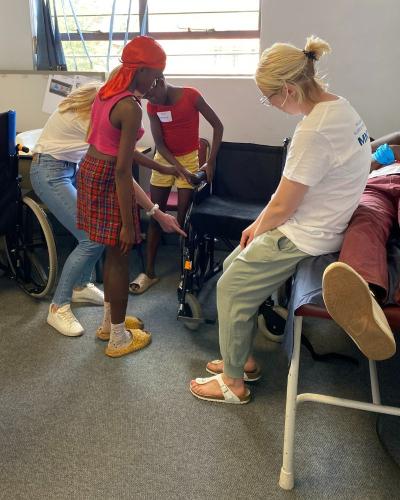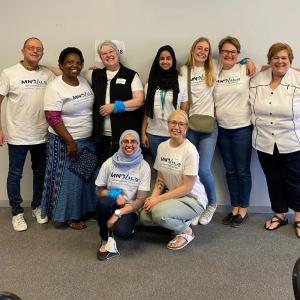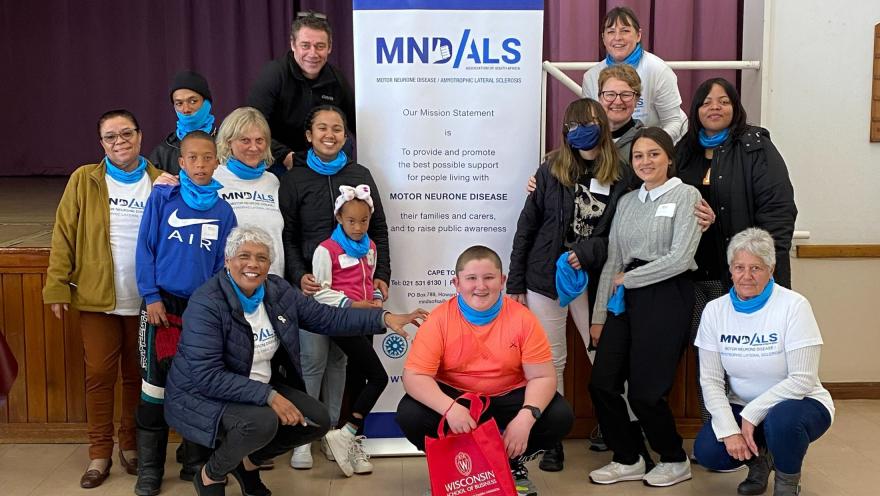In some ways, being a kid is being a kid no matter where you are from. Sure, the games they play are different, as are the songs they sing. Still, all kids want to explore their world, discover new things, grow, love and be loved.
But as young people who have a loved one with ALS know, childhood and growing up isn’t always easy. The reality is they very often have to take on the role of caregiver, in some form, which presents unique challenges. Training methods designed for adults may not address the needs of young caregivers on either physical or emotional levels, because kids aren’t just smaller adults, they’re kids.
The YCare youth caregiving training program, developed by Melinda S. Kavanaugh (Ph.D., LCSW), professor of social work at the Helen Bader School of Social Welfare at the University of Wisconsin-Milwaukee with support from The ALS Association, was developed to meet the needs of these young caregivers. Since 2015, YCare has provided support, training and resources for youth who help care for loved ones with ALS across the country. But there are young ALS caregivers in communities around the world as well, and at the International Alliance of ALS/MND Association meeting in late 2022, the creators of the YCare program and a team of local experts presented on how they are translating the YCare program, in some cases quite literally, for use in South Africa.

While Dr. Kavanaugh was confident the YCare model and resources developed in collaboration with The ALS Association would be beneficial in South Africa, she knew for the program to meet the needs of the many and varied communities it would need to serve, she would need people who understood the cultures and traditions of these communities. “We would never have been able to do any of this if not for the most amazing collaborators in South Africa,” she says. Kids may be kids, but they don’t all have the same family structure, or even speak the same language. So, while the world faced the global COVID-19 pandemic, a team of local experts was assembled to find a way to bring YCare to communities in South Africa.
Among the challenges they found was that some things that are often taken for granted in the U.S. were not givens in South Africa. Access to healthcare professionals or durable medical equipment, for instance, varies greatly across the country. The support and training programs and materials had to take this into account and allow for flexibility around what and who was available in local communities.
They also had to consider local differences in cultural, spiritual, and religious beliefs. There are also many languages in South Africa, so materials had to be designed with more pictures and graphics

and rely less on text. “South Africa is a diverse country. Therefore, the inclusion of the local content, child-friendly visuals and language is what is appealing for me,” says Thobeka Nkomo (Ph.D.), associate professor in social work at the School of Human and Community Development at the University of the Witwatersrand.
There is still much to be learned, and much to be done, but already the YCare program has proven to be helpful for young caregivers, if for no other reason than it has shown these young people that there are other young caregivers like them, they are valued and has given them a place to be open about what they are feeling. “(It’s) an opportunity to share experiences, discuss concerns and fears. Furthermore, to ask questions in a safe environment,” says Dr. Nkomo. “In this instance the beneficiaries experience a support structure without feeling judged. There is some sense of belonging and an opportunity to be vulnerable.”
The YCare program is still in its early days in South Africa. There are more communities with young caregivers in need of training and support, and there are more languages to translate. “This program is a significant initiative, and my hope is continuity and sustainability for the benefit of the recipients and their families and communities,” says Dr. Nkomo.
Perhaps at some point young caregivers become caregiver leaders themselves, taking what they have learned and bringing it to the next generation of young caregivers. Because there is probably no one who understands what it is like to be a young caregiver more than someone who has done it themselves, be it in South Africa, South Dakota, or anywhere around the globe.
We are continuing to share more about the ongoing worldwide progress taking place in ALS research, care and advocacy in our series “ALS Around the Globe.” We hope you will follow along and share with your family and friends.
To continue following stories about people living with ALS in the community and learn more about the disease, subscribe to receive our weekly blogs in your inbox HERE or follow us at als.org/blog.


Comments
I want to learn more about it how to treat a an old person
Thank you for your comment about caregiving. If you are referring to an older person as a caregiver, please click on this link https://www.als.org/navigating-als/for-caregivers . it will take you to information related to support for caregivers. In addition, you may want to connect with your association’s state office which you can locate here https://www.als.org/support/states for support groups that would be beneficial to you, whether in person or virtually. I hope this information will be helpful.
Join the conversation. Please comment below.